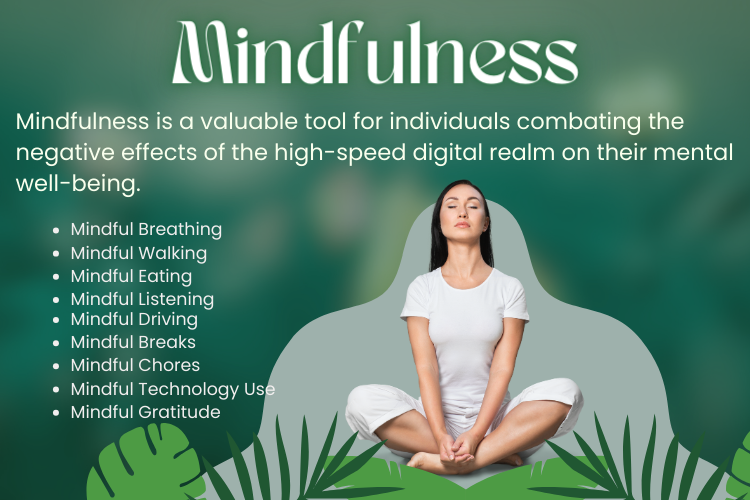Mindfulness in the Digital Age: Navigating the Challenges and Cultivating Well-Being
 Introduction
IntroductionThe fast-paced nature of the modern world has had both positive and negative effects on people's psychological well-being. In terms of positive effects, advanced technology has made information and resources more accessible, enabling people to learn, connect, and work more efficiently. Additionally, there's a growing awareness of mental health, leading to reduced stigma and improved access to mental health services. Furthermore, some individuals thrive in fast-paced environments, finding challenges and opportunities for personal growth. However, the downside is that the constant demands and information overload can lead to increased stress, anxiety, and burnout for many people. Quick access to information and distractions from screens can also contribute to shorter attention spans and difficulty in focusing. Despite increased connectivity through technology, some people may feel socially isolated due to screen time and decreased face-to-face interactions. Furthermore, busy lifestyles and screen use can disrupt sleep patterns, which can negatively impact mental health. It's important to recognize that the impact of the fast-paced world on psychological well-being varies from person to person. While some adapt and thrive, others may struggle.
Mindfulness in the Digital Age
Practicing mindfulness is one of the important techniques crucial for combating the negative influences on psychological well-being in today's fast-paced world. Mindfulness is a mental practice that involves paying deliberate and non-judgmental attention to the present moment. It often involves observing thoughts, feelings, sensations, and the surrounding environment with full awareness. This practice is often used to reduce stress, enhance well-being, and improve one's overall mental and emotional state. Contrary to common belief, mindfulness isn't limited to meditation; it can be incorporated into daily activities by simply paying attention to the present moment.
How to practice mindfulness during day to day activities?
Practicing mindfulness during your day-to-day activities is a great way to incorporate mindfulness into busy life.
1. *Mindful Breathing:* Throughout the day, take a moment to focus on your breath. Whether you're sitting at your desk, waiting in line, or commuting, pay attention to your breath for a few moments. Feel the sensation of the breath entering and leaving your body. This can help ground you in the present moment.
2. *Mindful Walking:* When walking, especially in a natural setting, practice mindful walking. Pay attention to each step, the sensation of your feet hitting the ground, and the movement of your body. Engage your senses by noticing the sights, sounds, and smells around you.
3. *Mindful Eating:* Instead of rushing through meals, savor your food mindfully. Pay attention to the colors, textures, and flavors of each bite. Chew slowly and be fully present with each mouthful. This not only enhances your enjoyment of food but also promotes digestion.
4. *Mindful Listening:* When in conversations, practice active listening. Give the speaker your full attention without thinking about your response. Listen not only to their words but also to their tone and body language. This fosters better communication and empathy.
5. *Mindful Driving:* While driving, be present on the road. Avoid distractions like checking your phone. Notice the sensation of holding the steering wheel, the movement of the car, and the surroundings. This can make your commute safer and more calming.
6. *Mindful Breaks:* Take short mindful breaks during your workday. Step away from your desk, close your eyes, and take a few deep breaths. Let go of any tension in your body and clear your mind. This can refresh your focus and reduce stress.
7. *Mindful Chores:* When doing household chores, like washing dishes or cleaning, bring your full attention to the task at hand. Feel the warm water on your hands, notice the sensations of cleaning, and be present in the moment.
8. Mindful Technology Use: Be mindful of how you use technology. Limit mindless scrolling on social media. Before reaching for your phone or computer, pause for a moment and ask yourself if it's necessary. Mindful technology use can reduce screen time and its associated stress.
09. Mindful Gratitude:* Throughout the day, take moments to express gratitude. Whether it's for a pleasant interaction, a meal, or a beautiful sight, acknowledging what you're grateful for can bring mindfulness into your attitude.
It is important to remember mindfulness is about being fully present and non-judgmental in the moment. Therefore, you don't need to set aside special time for these practices; you can incorporate them into your daily routine. Over time, these moments of mindfulness can lead to increased awareness and a greater sense of well-being.
Now, let us take a look at the positive outcomes that mindfulness brings to our lives
_What mindfulness brings to our lives ?_
Stay mindful during our day to day activities help reduce stress by promoting relaxation and calming the mind. This is essential in a world where stressors are abundant. Moreover, mindfulness practices enhance attention and concentration, which can counteract the detrimental effects of constant distractions and information overload, enabling individuals to better understand and manage their emotions, reducing emotional reactivity, and promoting emotional resilience. Also, mindfulness encourages self-reflection and self-awareness, helping individuals recognize negative thought patterns and behaviors that may harm their well-being. Regular mindfulness practice has been linked to increased overall well-being, including greater life satisfaction and happiness. Additionally, mindfulness can lead to more compassionate and empathetic interactions with others, strengthening interpersonal relationships. Sleep is one of the most essential things that helps boost one's psychological well-being. Mindfulness also aids in improving sleep quality, helping individuals combat the sleep problems often associated with the fast-paced lifestyle. Last but not least, mindfulness-based therapies have been shown to be effective in reducing symptoms of anxiety and depression.
Conclusion
In conclusion, practicing mindfulness is a valuable tool for individuals seeking to counteract the negative impacts of the fast-paced world on their psychological well-being. It provides a means of cultivating resilience, reducing stress, and promoting overall mental and emotional health in the face of modern challenges.
Related articles
Changing jobs might not always be the solution
- Author: IIPE Team
- Date: 21 Dec 2023
When it comes to the idea that changing jobs might not always be the immediate solution, there's a rich landscape...
How about exploring the impact of "intrusive thoughts" on mental well-being and strategies to manage them effectively?
- Author: IIPE Team
- Date: 06 Dec 2023
Dealing with intrusive thoughts presents challenges, but acquiring effective coping strategies can be immensely beneficial. These thoughts, characterized by persistent...




